Flower Net Read online
Page 22
He was lost and he looked it. Several times women approached him, mistaking him for a homeless man and offering him small change. When he asked for Spencer Lee or Yingyee Lee, they shook their heads and said they had never heard of those men. One matron asked Zhao his name. When he told her he was Wang Yujen, she suggested he go to the Wang family association house. She gave directions, pressed a dollar bill in his hand, then briskly continued on her way, calling out a final few words of reassurance. “They will help you.”
Zhao did not go to the family association house, where an immigrant might find help and where American-born Chinese of the Wang clan could find companionship and common interests years after their family’s arrival in the United States. Instead, he wandered into a video arcade, where the wire transmission was lost in the noise of simulated battles, drag races, and the players’ squeals and shouts of delight, outrage, encouragement, and triumph. But once back on the street, Zhao seemed to know exactly where to go.
He entered a 7-Eleven and again asked for Spencer Lee or Yingyee Lee. At first the clerk denied knowledge of either man. When Zhao insisted, his voice rising in frustration, explaining that he had a delivery for one of the Lees, that he’d been detained at the airport, that he’d come all the way to Monterey Park by himself—as a foreigner and totally new to the city—the clerk relented. “You wait here,” he said. “I will make a phone call.” When the clerk came back, he told Zhao to wait outside. Someone would be by to pick him up shortly.
From their vantage point in the van, David and Hulan could see Zhao anxiously standing on the street corner. He shifted from foot to foot, paced a few steps in one direction and back again. Then, in an apparent effort to calm himself, he squatted on his haunches, setting his small suitcase and his packages beside him. He could have been on a street corner in any Chinese city.
A black Mercedes with smoked-glass windows pulled up to the curb. The driver rolled down the window and called out, “You are Wang Yujen?”
Zhao nodded enthusiastically.
Inside the van, David groaned. “He’s got to talk. The tape won’t pick up nods.”
Zhao opened the door to the backseat, put his belongings inside, and, without a glance toward the van, got into the front seat of the car.
The driver said in disgust, “You smell like you haven’t taken a shower in ten thousand years.”
“Sorry, so sorry.”
Keeping a safe distance, Jack Campbell followed the Mercedes through the business district, then into a residential area. The Mercedes began to snake its way up a winding road. The houses got bigger, changing from 1950s tract homes into ostentatious mansions too large for their lots.
“Chinese people live in these villas?” Peter asked. When he found that they did, he shook his head in disbelief. What was called a villa in Beijing was nothing compared to the size of these Spanish-style monstrosities.
The Mercedes slowed, waited for a pair of electronic gates—each with the character for happiness rendered in wrought iron—to slide open, then pulled inside. The driver didn’t bother to close the gate behind him. Gardner parked the van across the street. When Spencer Lee got out of the car, David immediately recognized him. Tonight he was nattily dressed in a silk shirt, creamy white slacks, and tennis shoes.
“Hurry up, hurry up,” he ordered.
Zhao got his possessions out of the car and followed Spencer Lee up the marble steps and into the house. Over the transmission, they could hear Zhao exclaiming over the foyer and the living room. “Be quiet,” Lee snapped. “Too much noise. You sit down and tell me why you are here.”
The next few minutes proved to be the toughest for the team in the van as they listened to Zhao—through Hulan’s translation—recount his misadventures at the hands of the law. To David, Zhao sounded like a groveling fuck-up. Zhao was just a poor peasant. He didn’t understand anything of what happened. He was afraid when the foreign devil came up and took him away. He thought he was going to be executed. In other words, David thought Zhao sounded believable, but Spencer Lee was not so easily satisfied.
“They take Hu Qichen. They put you in another room. Okay. I see that. But why are you here? Why do I not see Hu Qichen?”
Zhao’s reaction surprised David. “Fuck my mother! Fuck your mother! Someone says, You go to America, you come home, you make some yuan. I think, Maybe I earn enough to buy an automobile. Maybe I can be a driver for foreigners. But I tell you what happens. I come to America. The policeman looks in my mouth. He puts his fingers up my asshole. I’m thinking, Next thing this man is going to put a bullet in my head. My children will have no father. My wife will go and marry Noodle-man Zhou. He has his eyes on her for many years. I’m thinking, Maybe I don’t want to buy a car. Maybe I want to stay alive. Better to be a poor man in China than dead in this ugly place. Fuck your mother!”
The tirade—shrill and loud—ended as abruptly as it began. Dead silence followed, then Spencer Lee began to laugh.
“Sit down, Mr. Wang. Have a cup of tea.”
“Eaaah,” Zhao grunted, still annoyed.
During the next few minutes, tea was brought in and Spencer Lee checked his contraband. When Zhao saw what the merchandise was, he once again feigned curiosity.
“What do you have there?”
“Bear bile.”
“I bring that into the country for you and you don’t tell me?”
“Yes, but you will be paid, remember?”
As Spencer Lee measured the loose crystals, Zhao asked, “Where do you get that?”
“It is no concern of yours.”
“You tell me things, I will understand. Next time I make this trip for you I do an even better job.”
There was silence on the transmission as Lee considered. “Yeah. Okay. You did a good job. You got here, right?” Zhao didn’t respond. “Up in Jilin Province, too many Koreans. They’re not trustworthy and the price is too high. Heilongjiang Province is too remote—close to Beijing if you can fly but dangerous, and it’s too hard to get merchandise to Beijing overland. So, we get our bear products from Sichuan Province.”
In the van, Hulan said, “That’s where Guang Mingyun was in the labor camp.”
David thought, Right, and so were your father and Section Chief Zai.
The transmission resumed with Spencer Lee. “Hundreds of bear farms around Chengdu and the police don’t care who buys, who sells. You know what I mean? We go to the airport. We tell the officials that our bear bile comes from a farm with a license. Everything is legal. No problem.”
“Why is some in a bottle, some loose like that?”
“Different products, different farms, same price.”
“But that one in the bottle is Panda Brand. That company is Guang Mingyun company.”
“So?”
“Guang Mingyun works for you?”
In the van, as Hulan translated this exchange, David marveled at how deftly Zhao was playing to Lee’s ego.
“Guang Mingyun has many businesses,” Lee replied enigmatically.
“I see,” Zhao said, as though deep in thought. “Guang Mingyun is Rising Phoenix, too.”
“A curious man can become a dead man,” Lee remarked. “Guang Mingyun likes money. I like money. You like money. That’s enough to know.”
Zhao nervously fell back into the sycophant role. “You use me again next time, right? I bring more in for you, maybe work for you. Maybe come to America?”
“We’ll see,” Spencer Lee said.
“What do you want me to do now? You have another job for me?”
“You go back to China, like the original plan. Next time I need someone, I will have Cao Hua contact you.” In the van, the team heard the sounds of teacups being set down, a chair scraping on the floor, and Spencer Lee opening his wallet. “Here’s your money. I’ll have someone take you to a motel. You stay there. Don’t get into trouble. Tomorrow we’ll take you to the airport. You did a good job for us. I will remember you next time.”
As Zhao
offered profuse thanks, Hulan said, “That’s our cue. Let’s go.”
The group walked up to the front door and rang the doorbell. When Spencer Lee answered, Jack Campbell said, “You are under arrest. You have the right to remain silent…”
Even sitting in a federal jail interrogation room, Spencer Lee’s impertinence showed no signs of diminishing. If anything, he became even more haughty. So far he had refused his right to an attorney or to a phone call. He seemed convinced that he could rely on his wits. Only his chain-smoking betrayed any tension.
At David’s insistence, Hulan and Peter were barred from the room. From where they now stood on the other side of a two-way mirror, they could see Spencer Lee in profile sitting on one side of the table with David sitting directly opposite. Their faces were just inches apart and the intensity with which each man spoke was perceptible even through the glass.
“Isn’t it a fact that you are a lieutenant in the Rising Phoenix gang?”
“Rising Phoenix? I have told you before, we are a fraternal organization.”
“You and your cohorts chartered a boat called the China Peony in December of last year. At the beginning of January, you picked up Chinese immigrants and brought them to America. Your crew deserted the ship.”
No answer.
“Who do you purchase bear bile from in China?”
Again David received no answer.
“How did Billy Watson and Guang Henglai fit into your scheme?”
“I’m unfamiliar with those names.”
“They weren’t couriers in your business?”
“I don’t know what business that could be,” Lee said evenly.
“Tell me about your connection to Guang Mingyun.”
“Guang Mingyun?” Spencer Lee let the name linger on his lips contemplatively.
“You spoke with Mr. Zhao about Guang Mingyun this evening.”
“You must be mistaken.” Lee lit another cigarette.
“I’m going to ask you again,” David said calmly, deliberately. “Would you care to elaborate on Guang Mingyun’s involvement in the smuggling of medicinal products made from endangered animals?”
“I’m getting tired of these questions,” Lee said.
“I see from your passport that you travel back and forth from China with some regularity,” David continued.
“A month here, a month there. No difference.”
“Not every Chinese gets a visa so easily,” David tossed out.
“The American embassy…” Lee hesitated.
“Yes?”
“I have a good record with the American embassy.” Cigarette smoke curled about Lee’s face.
“Are you implying that you pay bribes for your visas?”
Spencer leaned forward, putting his face close to David’s. “Mr. Stark, you have no proof of anything. Why don’t you let me go home?”
David stared Lee straight in the eye. “I do have one more question concerning your passport.”
“Go ahead.”
“A passport, as you know, records the dates of exit and entry.”
“So?”
“I see you were in Beijing for a little more than a month from December tenth to January eleventh.”
“So?” Lee repeated.
“So, the China Peony was chartered on December eleventh. It was a large ship, so its cargo took a couple of days to load. This took place on January first and second. On January third, it set sail. But of course you know all this.”
“I have already told you I know nothing about that ship.”
“During this time there were two other occurrences in Beijing that are of interest to me,” David said in a conversational tone. “On December thirty-first, Billy Watson, the son of the American ambassador, disappeared. On or about the same date, Guang Henglai, the son of Guang Mingyun, also disappeared. As I’m sure you know, the body of Henglai was found aboard the Peony. Perhaps even more intriguing from where I sit is that the body of Billy Watson was found on January tenth. And why is that interesting? Because the very next day you flew to Los Angeles.”
The eyes of the two men remained locked. The muscles of Spencer Lee’s jaw clenched. David’s look was stony. The Chinese man broke the silence with a toss of his head and a light laugh. “I guess I will make that phone call now.”
Twenty minutes later a triad lawyer sat at Spencer Lee’s side vehemently arguing that his client hadn’t been advised of his full rights, claiming unlawful entry, and generally making a loud fuss over the lack of sufficient evidence. Spencer Lee was booked and put in the lockup. His lawyer was told that there would be a bail hearing before a federal magistrate in the morning.
The arrest, even without the satisfaction of all the questions being answered, was cause for celebration. Instead of going together as a group, the different factions came to a tacit agreement. Jack Campbell outlined an evening of American debauchery for himself, Gardner, Peter, and Zhao: a visit to Universal Studios for a tour and rides, followed by bar hopping and putting away as much liquor as their bodies could handle, followed perhaps by a couple of lap-dancing clubs. Zhao declined the invitation, saying he was exhausted. David and Hulan would have a quiet dinner.
But first a certain amount of paperwork and other odds and ends needed to be handled. Hulan wanted Spencer Lee sent to China, where he would be tried for the murders of Watson and Guang, rather than have him stay in the United States, where he would face only the relatively minor smuggling counts.
But China didn’t have an extradition treaty with the United States. Phone calls were made to the State Department and to China’s Ministry of Foreign Affairs to see if an exception could be made, but David and Hulan were basically told by their respective governments that they were out of their minds. “We just caught those bastards trying to sell nuclear trigger components in our country,” Patrick O’Kelly responded. “If the Chinese want to discuss the proliferation of nuclear arms, then we will be happy to listen.” When David argued that the man from the State Department had gotten him into this, that he was the one who wanted the murders solved, O’Kelly answered, “The situation has changed. National security is far more important than the deaths of two people half a world away.” When David said that Ambassador Watson might not feel that way, O’Kelly hung up on him.
O’Kelly’s counterpart in Beijing was no less adamant. “The United States government is nothing but an aggressive regime. The president is weak-minded, fat, and a braggart! The Americans are trying to use the face-washing basin to cook fish! But we will not stand for their nonsense or their insults. There are no triads, and we certainly aren’t selling our nuclear technology abroad. These fantasies are insulting to the people of China. Tell the Americans to get their warships out of the strait, then maybe we can talk.”
After the calls, Hulan asked, “Isn’t there something we can do? Can’t you deport Lee?”
“We need to have grounds for deportation—that he entered the country illegally or that he was here illegally,” David answered. “As far as I can tell, his papers are in order. We can deport him after he’s tried, convicted, and served his sentence for smuggling, but…”
“But what?”
“But that doesn’t necessarily mean he’ll end up in China. He’ll get to choose which country he wants to go to. We can’t be assured that he’ll pick China.”
“Especially if he knows I’ll be waiting for him.”
“In the meantime, everything Laurie’s told us about the light penalties for smuggling convinces me that Lee will be released on bail tomorrow.” David could only hope that the magistrate would listen to his pleas that Lee presented a threat to the community, that the U.S. Attorney’s Office believed he was tied to the smuggling of human beings as well as the murders in China, and would decide to hold him. Either way, Hulan and David would continue looking for evidence to tie Lee to those crimes.
Before the two groups went their separate ways, something needed to be done about Zhao. He had spent the last couple of
hours sitting in an orange plastic chair in the jail’s lobby. In those two hours, he had seen a side of America that made him long for the familiar hardships of his home village. David had in the back of his mind that they would put Zhao in the witness protection program, but this took time to set up. David pulled out his wallet, gave $100 to the immigrant and a credit card number to Noel Gardner, and said, “Take Mr. Zhao to a hotel—a good one. We’re all tired. We’ll figure everything out tomorrow.”
With smiles, bows of the head, and a final round of shaking hands, Zhao was led away by Gardner, who would drive him to a nearby hotel, then hook up with Campbell and Peter later. As Zhao walked down the grungy hallway, David saw a man who still looked confused by the world around him but was no longer resigned to his fate. Zhao bobbed his head once more and gave a thumbs-up, which meant the same thing in China and America.
At last, David and Hulan left the station and headed out to Patina Restaurant on Melrose. David ordered champagne. The waiter popped the cork, poured the liquid into fluted glasses, then quietly backed away. David and Hulan sat in companionable silence. They were both tired but feeling a deep sense of accomplishment.
Finally David said, “I’ve been thinking about Guang Mingyun.”
He didn’t notice Hulan’s grimace.
“He has all the money in the world. Why would he risk getting caught for smuggling?”
“Sometimes people get addicted to making money,” Hulan said.
“But why would a guy like that deal with the Rising Phoenix?” David persisted.
“We don’t know for sure that Guang is involved with them. Remember, Zhao asked the question, but Lee didn’t answer it.”
“Okay, but just suppose he is.”
“The triad has a method of transporting the merchandise and the connections here to sell it.”
“I see that,” he agreed. “But then why would they kill Henglai? Or Billy, for that matter?”
“I don’t know. Maybe Guang was trying to cheat the triads and they retaliated. Maybe the boys were trying to cheat Guang.”

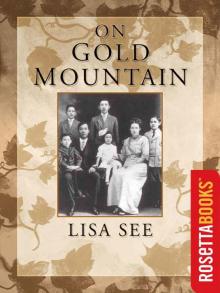 On Gold Mountain: The One-Hundred-Year Odyssey of My Chinese-American Family
On Gold Mountain: The One-Hundred-Year Odyssey of My Chinese-American Family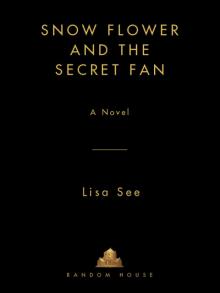 Snow Flower and the Secret Fan
Snow Flower and the Secret Fan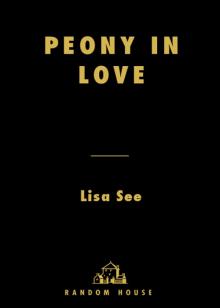 Peony in Love
Peony in Love Flower Net
Flower Net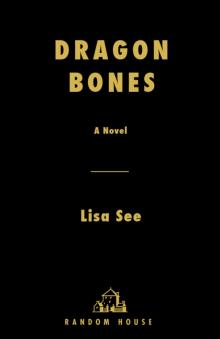 Dragon Bones
Dragon Bones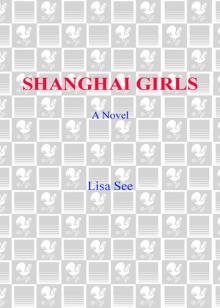 Shanghai Girls
Shanghai Girls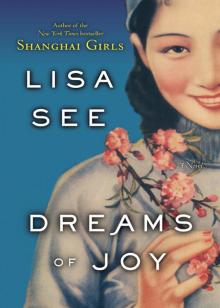 Dreams of Joy
Dreams of Joy The Island of Sea Women
The Island of Sea Women The Tea Girl of Hummingbird Lane
The Tea Girl of Hummingbird Lane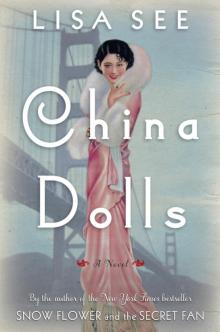 China Dolls
China Dolls The Interior
The Interior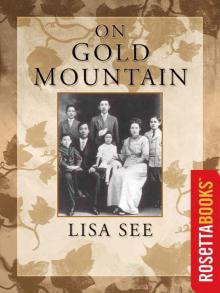 On Gold Mountain
On Gold Mountain